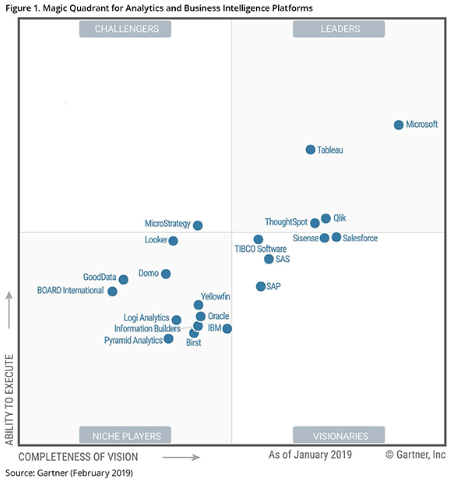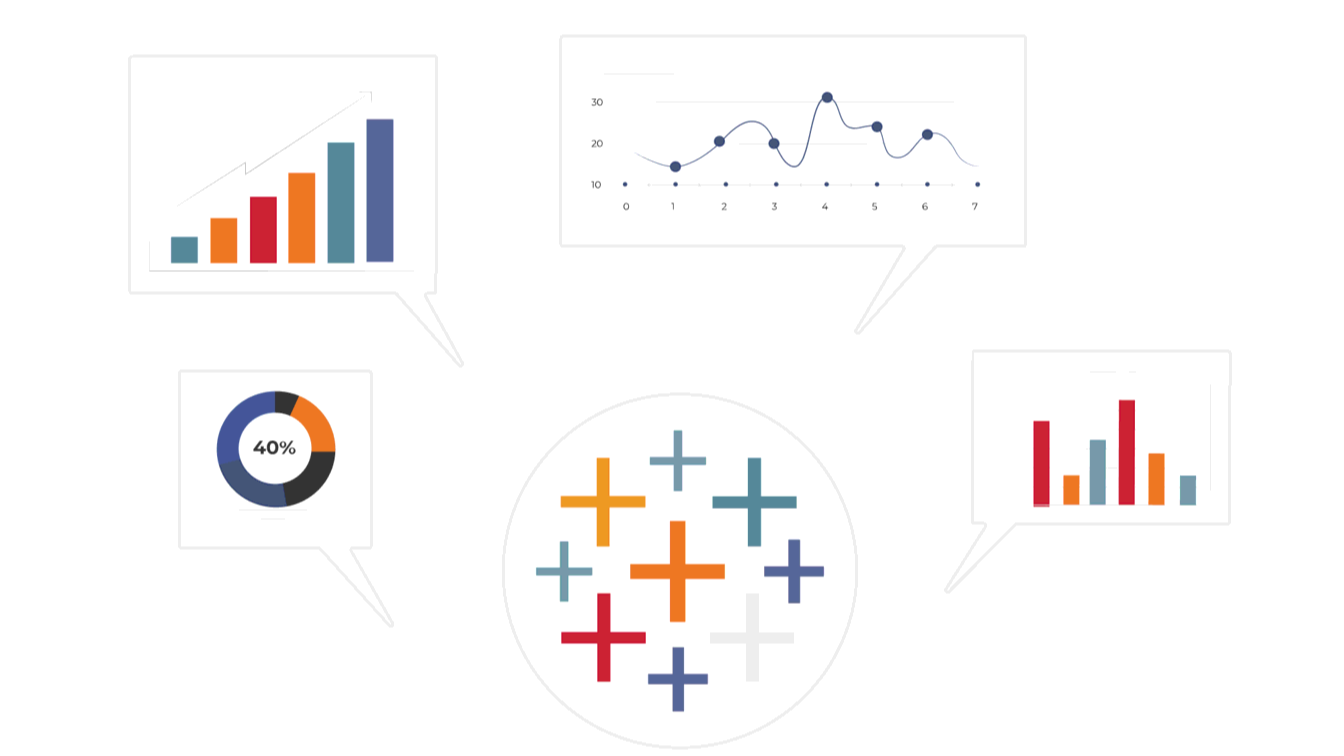Tableau learning
Tableau Career Opportunities: 5 Reasons to Learn Tableau
Tableau is a powerful data visualization and business intelligence tool that enables users to analyze and present data insights effectively. Its user-friendly interface, interactive visualizations, and real-time data analysis capabilities make it a valuable asset for data-driven decision-making. Tableau's extensive connectivity to various data sources, along with features like data blending and geospatial visualization, allows users to explore complex datasets and uncover valuable insights. Its versatility and widespread adoption across industries make Tableau a leading choice for professionals seeking to transform raw data into actionable knowledge.
Careers in Tableau are highly sought-after. There is no better time than the present to seek Tableau certification and launch a career in business intelligence and data analytics, according to analysis of Google Trends data.
If you're unsure of why you should start studying Tableau, don't worry; we've got you covered with five excellent arguments!
- In-Demand Skillset
- Versatility Across Industries
- Variety of Job Roles on Offer
- Future of Tableau Careers
- Seamless Data Exploration
1. In-Demand Skillset
Tableau's prominence as a data visualization and analytics tool has soared in today's data-driven environment, making it a highly sought-after skillset by enterprises everywhere. The capacity to evaluate and present data in a visually appealing way, which is essential for data-driven decision-making, is a skill that professionals acquire by mastering Tableau. As businesses look to harness the power of data to achieve a competitive edge, there is an increase in demand for Tableau specialists. Learning Tableau increases your employability and positions you as a valuable asset in the job market, opening up a wide range of professional prospects across different industries. A meaningful profession where you can contribute significantly to turning unstructured data into useful insights and accelerating corporate performance is made possible by embracing Tableau.
2. Versatility Across Industries
Tableau's versatility is evident in its widespread adoption by top companies across various industries. In finance, companies like JPMorgan Chase, Citigroup, and Goldman Sachs use Tableau to analyze financial data, monitor market trends, and optimize investment strategies. In healthcare, organizations like Johnson & Johnson, Pfizer, and Mayo Clinic leverage Tableau for patient data analysis, medical research, and healthcare service optimization. The technology sector also relies on Tableau, with companies like Microsoft, Cisco, and Adobe using it for business intelligence, customer analytics, and product performance analysis. Retail giants Walmart, Amazon, and Target gain valuable insights into consumer behavior and optimize supply chain operations using Tableau. Moreover, entertainment industry leaders Netflix, Disney, and Warner Bros. depend on Tableau to analyze viewership data, optimize content recommendations, and drive marketing strategies. Tableau's presence even extends to government organizations, where entities like NASA, the U.S. Department of Defense, and the Federal Reserve utilize it for data-driven decision-making. This extensive adoption across diverse industries solidifies Tableau's position as a powerful tool for data visualization and analysis, making it an essential skillset for professionals seeking to excel in the data-driven world.
3. Variety of Job Roles on Offer
The nice part about Tableau jobs is that you may select from a wide range of employment responsibilities and at different stages of your career. The following list of popular job titles for Tableau specialists.
- Data analyst: To explore and analyze data, produce visuals, and glean insights to assist corporate decision-making, data analysts utilize Tableau.
- Business Intelligence Analyst (BI Analyst): BI analysts use Tableau to build dynamic dashboards and reports that let users extract insightful information from data.
- Data visualization specialist: To create aesthetically appealing and powerful data visualizations, visualization professionals make advantage of Tableau's sophisticated capabilities.
- Data Scientist: To analyze and visualize large, complicated datasets, find trends, and create prediction models, data scientists utilize Tableau.
- Business Analyst: corporate analysts use Tableau to evaluate business data and trends, offering insightful information that helps to advance corporate operations and plans.
- Data Engineer: For smooth data analysis and visualization, data engineers integrate data from numerous sources into Tableau.
- Data Storyteller: Data storytellers utilize Tableau to build engrossing narratives out of data and successfully share findings with various audiences.
- Data Consultant: Clients receive assistance from data consultants using Tableau for data analysis, visualization, and the implementation of data-driven initiatives.
- Marketing Analyst: To improve marketing tactics, marketing analysts utilize Tableau to evaluate data from marketing campaigns, consumer behavior, and ROI.
- Financial Analyst: To analyze financial data, create budgets, and predict financial patterns, financial analysts use Tableau.
- Operations Analyst: To evaluate operational data, spot inefficiencies, and enhance procedures, operations analysts utilize Tableau.
- Healthcare Analyst: To evaluate patient data, healthcare trends, and improve healthcare services, healthcare analysts utilize Tableau.
- supply chain Analyst: To evaluate data from the supply chain, keep track of inventories, and improve logistics.
Tableau's versatility allows professionals from various domains to use it as a powerful tool for data analysis and visualization, making it a valuable skillset across a broad spectrum of job roles. Whether you're interested in data analysis, business intelligence, marketing, finance, or any other field, Tableau skills can open doors to exciting and diverse career opportunities.
4. Future of Tableau Careers
As businesses depend more and more on data-driven insights, Tableau specialists will be essential in turning raw data into useful intelligence. Tableau specialists have a tremendous opportunity to change the data analytics environment in the future.

So what are you waiting for? Many Business Intelligence professionals have already realized this trend and have been busy mastering Tableau to up-skill themselves. Don’t fall behind; learn Tableau to get on the data visualization bandwagon now!
5. Seamless data exploration

The key feature of Tableau that enables users to easily access and analyze data is seamless data exploration. Users can build meaningful dashboards and reports fast using Tableau because to its user-friendly interface and interactive visualizations. Users may quickly filter and sort data, drill down into specifics for more in-depth research, and drag and drop data fields to generate visualizations. Due to the constant updating of the data due to the real-time data connection, correct and pertinent insights are provided. Users are empowered to make data-driven decisions more quickly, see trends, and find hidden patterns thanks to this fluid data exploration, which also improves performance. Tableau is a powerful tool for acquiring insightful information and making decisions, whether you are a data analyst, business user, or executive.
Conclusion:
Learning Tableau opens up a world of opportunities, as it offers an in-demand skillset, versatility across industries, and a diverse range of job roles. The future of Tableau careers is promising, with seamless data exploration capabilities paving the way for impactful data-driven insights. Embrace Tableau today, and embark on a fulfilling journey of data visualization and analytics excellence.
